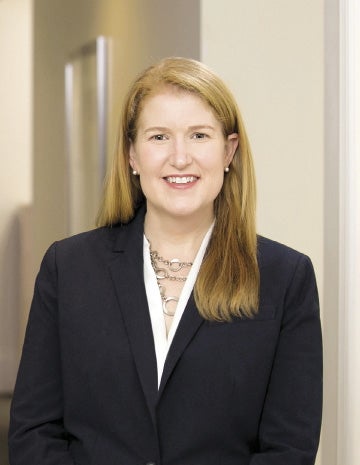Harrington joined Bowditch in 2022 after starting off her legal career in the public sector.
Get Instant Access to This Article
Subscribe to Worcester Business Journal and get immediate access to all of our subscriber-only content and much more.
- Critical Central Massachusetts business news updated daily.
- Immediate access to all subscriber-only content on our website.
- Bi-weekly print or digital editions of our award-winning publication.
- Special bonus issues like the WBJ Book of Lists.
- Exclusive ticket prize draws for our in-person events.
Click here to purchase a paywall bypass link for this article.
More than 50% of attorneys at Bowditch & Dewey, one of three largest law firms in Worcester County, are female, with three of the firm’s five leadership team members being women. In 2003, Bowditch launched its women’s initiative, a collaborative group providing support for women’s growth at the firm and achievement in the industry.
One member of the women’s initiative is Brigid Harrington, a partner and employment and labor attorney, who has experience assisting higher education clients with civil rights compliance, as well as representing biotech companies and nonprofits. Harrington joined Bowditch in 2022 after starting off her legal career in the public sector.
Did you always know you wanted to go into the law field?
I always had a good idea. I graduated college and didn't have a set plan of what I wanted to do other than continue school. So I applied to law school and found a path that was easy to take, rather than go out there and try to get a job right away. It wasn’t until I was in law school when I realized I wanted to be a prosecutor. When I did a semester internship through the school with the Middlesex County District Attorney’s Office, I got the chance to see what it would be like to work there, and that made up my mind for me.
What did your career look like before joining Bowditch?
I started in the private sector in 2022, so I have only been at Bowditch for a few years. I started my career clerking at the Massachusetts Appeals Court before working at the Manhattan District Attorney's Office for seven years. Eventually, I found myself wanting to go back to an investigation space and moved to Harvard University, where I started doing Title IX investigations. From there, I went on to be the director of civil rights at UMass Boston, where I oversaw a variety of civil rights laws such as Title IX and Americans with Disabilities Act compliance.
What is the difference between working in the public and private sector?
The main difference is having a variety of clients and having to tailor your approach based on the client you are dealing with. When I worked in the public sector as a district attorney, my judgment and guidance was really important, and it was ultimately what happened. Obviously, you had supervisors to clear things with, but if I thought a case should be dismissed, I could typically get it dismissed.
When working for a client in the private sector, my judgment and advice is still important, but it's not always what happens. So it's being able to give advice and being comfortable with the idea they might not follow it because they might have other aspects of their business they're thinking about and not prioritizing the area that you're looking at.
How do you balance your roles as employment and labor attorney and partner at Bowditch and Dewey?
I have been able to build out a group of labor and employment lawyers who focus on providing services to colleges and universities. I have been leading that group, and it has been very successful.
At the beginning, I was focused on doing the work we had and getting it done well. Doing quality work as an attorney is the cornerstone, and you can’t sacrifice that. But as the practice has grown, I have found myself doing more marketing. I frequently meet with my clients and prospective clients and figure out what they need and how I can best help them.
As a partner, instead of using marketing to sell them something, I try to think about the role as trying to help them. I am really good at helping people, and that’s what I have based my career on. So when I think about it that way, it feels natural, and it has helped me build my business from a really authentic place.
What are the goals of the women’s initiative?
At the women’s initiative, we review research together to find things that might be relevant to our business areas and discuss them. On the lighter side, we get together and talk and participate in company outings. We get to talk about challenges we have in common such as managing a family and career. While men may face these issues too, it is something I think women tend to struggle with a bit more.
The number of women partners in Bowditch is growing, and the initiative provides a great opportunity to get together and help each other up the ladder.
What are your future plans?
I see my long-term future at Bowditch. I would like to grow our practice a bit more and personally, rise within the ranks of the partnership. We have a great model, and I am excited to see it grow in the years to come.
This interview was conducted and edited for length and clarity by WBJ Correspondent Sara Bedigian.
CORRECTION: A previous version of this story incorrectly said Brigid Harrington's hometown is Worcester. The correct information is her birthplace is Worcester and her hometown is Sterling. Additionally, a previous version of the article incorrectly said she started in private practice in 2021. The correct year is 2022.

